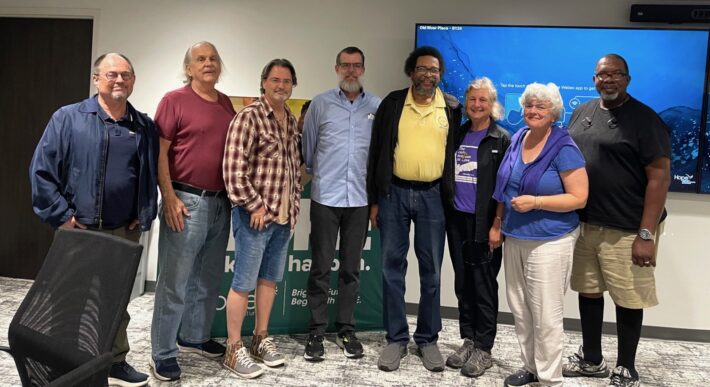“Every day, [Hope Credit Union] proves that banking practices can narrow the wealth gap and advance economic justice. An idea that many write off as naïve and folly, Hope makes real through passionate commitment and meticulous follow-through.”
Once in a while I think I’m beginning to really understand racism, the suffering it has caused and still causes and the tenacity it invokes. And then some new bit of information blindsides me and reminds me of how much more there is to understand. I counted on the Deep South Investors Tour to help me along. It delivered every day.
One afternoon our group met Frank Figgers, a wise African-American elder, long-time civil rights activist, and masterful storyteller. He shared his work in the movement. And he shared a tale from his childhood about how he had only one pair of shoes at a time, shoes that were saved for Sundays. It reminded me of my father telling me about growing up in Italy between the World Wars, how he tied the laces of his one pair of shoes together and slung them over his shoulder for his long walk to school on dirt roads. My people would understand Mr. Figgers’ story. It made us one in hardship, one in resilience. Mr. Figgers further explained: “You could buy shoes in 1962 in Mississippi, but my parents would trace my foot on a piece of cardboard and stick the cardboard in the shoe at the store. If it fit [inside], they would buy it. You could buy stuff, but you could not try it on.”
You could not try it on in 1962. This stops me cold. Our commonality ends right there. It’s one more dimension of segregation. It makes sense and it makes no sense. It feels like all my neurons need to reorder themselves, taking in one more dimension of what our nation has been and how we humans can be so cruel to one another.

Life can be very hard, hard for all of us. It is part of being human. And then there is the racism, colonialism, and other “-isms,” often numerous and layered, that are insidiously built into the systems that shape our days. They can feel inescapable.
Each day of the tour brought new tales of indignities and worse, some from the past and some here and now, whether we were near the Pettus Bridge hearing a firsthand account from the youngest person who marched from Selma to Montgomery, or in the courtroom where Emmett Till’s killers were acquitted, or amidst the majestic trinity of museums that make up the Legacy Sites in Montgomery. Or even as we simply drove down the road in our van, noting the countless storefronts of payday loan creditors that can currently charge up to 460% interest in Tennessee.
On the tour, we regularly encountered different people who work at Hope Enterprise Corporation and Hope Credit Union. They spoke to their new goal to eliminate the racial wealth gap in the region. Hope leaders seek out communities where there are no banks, where banks have left because it’s not lucrative, and more generally, where people are “underbanked.” Really? Yes. They recount that when someone walks into one of their offices needing resources, the staff’s goal is to “look for a way to say yes,” whether they need a personal loan, a car loan, or a mortgage. Most financial institutions expect credit ratings of 750+ to qualify for a loan or mortgage. Hope will accept credit ratings as low as 580, alongside evidence that the applicant can demonstrate they pay their bills and rent consistently over time. And if they don’t, staff will help them make a plan to get there. As a part of Hope Enterprise Corporation, Hope Policy Institute researches inequities and their sources, and advances recommendations that can inform their own work and that of others. They use their findings to work with legislators and partners and have advocated to Congress for economic opportunity and justice. Their Enterprise Corporation also offers venture capital funding and development of community infrastructure and housing. This too, is part of their work as the largest Black-and-women-owned credit union in the country.
Again my neurons are frenzied, hearing about a financial institution systematically acting as an undaunted enabler of wellbeing at an individual and systems level, and especially for the economically poor. Every day, they prove that banking practices can narrow the wealth gap and advance economic justice. An idea that many write off as naïve and folly, Hope makes real through passionate commitment and meticulous follow-through.
This cognitive dissonance does me great good. It convinces me that a justice that’s proclaimed across faith traditions, and all people of good will, is not just an idea that inevitably contradicts our daily realities. It shows how our values and practices don’t need to keep two sets of books, how we can dwell in the possibility of narrowing the racial wealth gap, and how we concretely can abet Hope’s work in making this possible.
Sonia Caus Gleason | November 2024
Sonia Caus Gleason is a strategy and learning consultant working with foundations and non-profits to deepen their racial and social justice commitments.